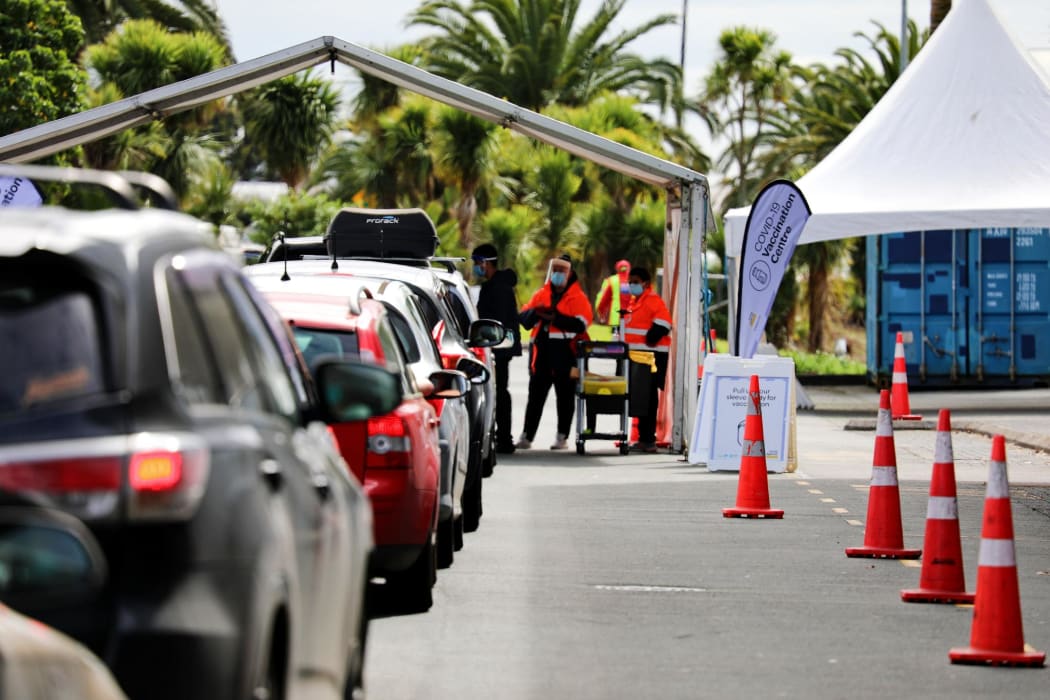New Zealand should be aiming to vaccinate 90 percent of the eligible population if society is to cope with the Delta variant, a leading epidemiologist says.

People waiting for their turn at the drive-through vaccination centre at the Trusts Arena last week. Photo: RNZ/Nick Monro
Rod Jackson, a professor of epidemiology at the University of Auckland, told Nine to Noon coping with a quickly-spreading Delta variant required a maximum possible level of vaccination.
If the virus spread among essential workers more restrictions would be needed, he said.
"If we find in the next couple of days that that is continuing to happen, then we're going to have to go to something like level 4.5 and that's going to be particularly important for the essential workers.
"They're all going to need to be vaccinated, they're all going to need to wear N95 masks. They're all going to need to try harder to keep this infection at bay.
"The only thing certain in this whole pandemic is that if you keep infected people away from uninfected people, we'll knock this on the head."
Jackson said working out best practice with Delta is new territory for the world, and everyone was behind the game.
But New Zealand simply didn't have enough vaccine, and should look to bring others, he said.
On Friday, almost 90,000 vaccines were administered, the second biggest daily total to date.
Associate Minister of Health Ayesha Verrall said the government would try to work out how to keep vaccination rates at the increased rate, rather than the 50,000 to 60,000 a day that is sustainable at current supply arrangements.
"We just don't have enough vaccine so we need to find a way around that, and you know one of the ways around that is to bring in other vaccines."
As well as the Pfizer vaccine, Medsafe has approved the AstraZeneca and Janssen vaccines.
"For those who want to get it now, I think we should be seriously looking at other vaccines."
The best situation for health and the economy remained elimination, which simply meant not having the virus currently spreading in the community.
"In New South Wales that may no longer be possible. It might have got out of hand so … their hand may have been forced and they may be into suppression, which is keeping a lid on this, trying to keep the numbers down."
The biggest short term threat is exponential spread, but looking towards the longer term, modelling is going on to work out how to manage the virus once the vaccine is offered to everyone.
"It basically goes like this, that you're either going to get Covid, or you get vaccinated. If you get vaccinated some people will still get Covid, but for a vaccinated person, Covid is like a bad flu. If you're unvaccinated it's at least 20 times worse than a 'flu. It's a different disease.
"Modelling out of Australia - and I think it'll probably be very similar in New Zealand - is that if you get to 90 percent of eligible vaccinated then you may have 1000 deaths."
As well as lowering the potential number of deaths, a greater than 90 percent vaccination rate would help hospitalisation rates.
People in ICU with Covid-19 require more staff and resources, and would keep out two or three other people who might need to be there, Jackson said.
"My plea is that for all New Zealanders and all of the commentators to come up with innovative and constructive ways to help the vaccine hesitant become vaccinated."
He said the vast majority of people who had not yet been vaccinated or who had not made an appointment were not against vaccines, but were hesitant.




